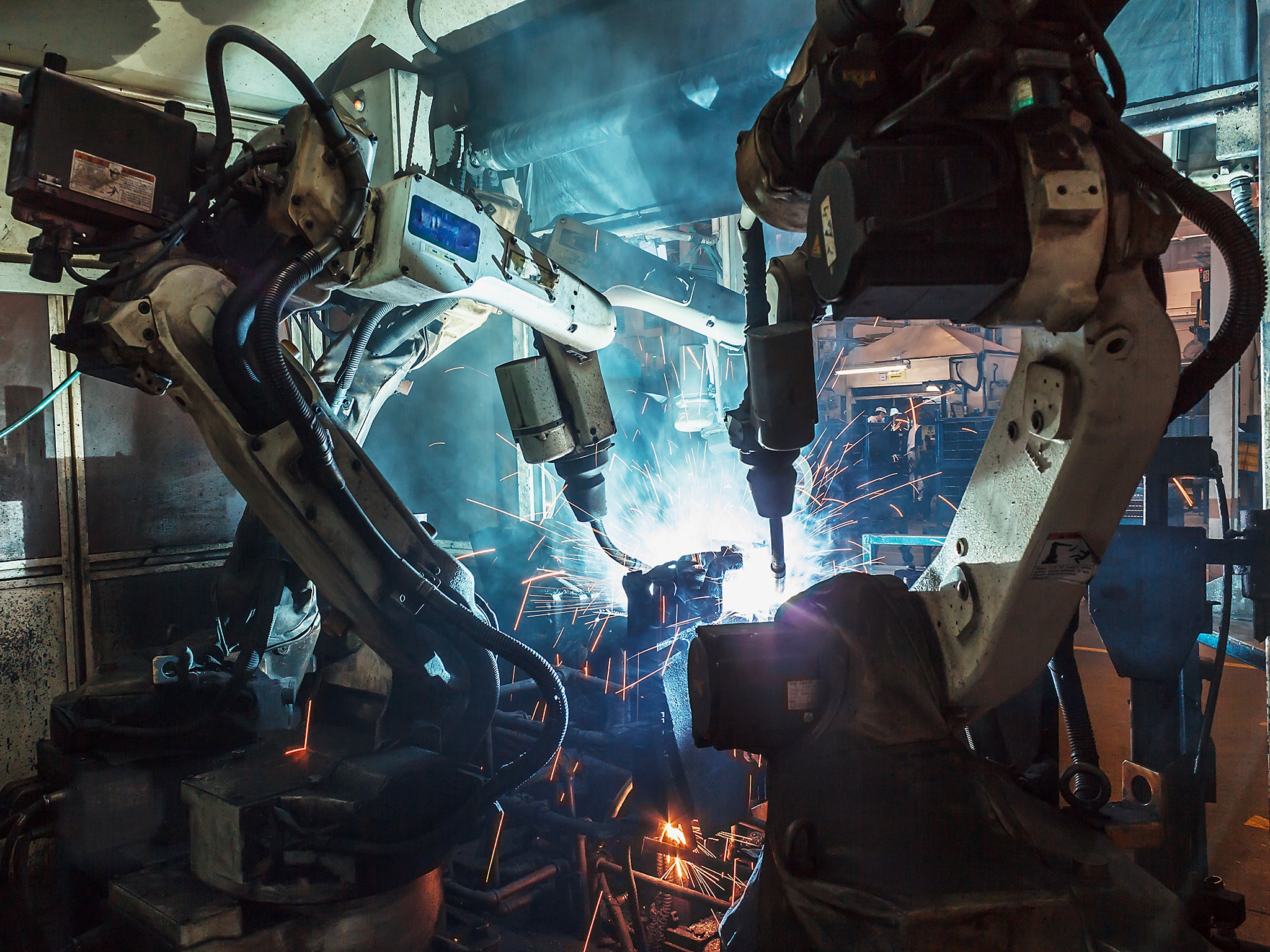The Independent's journalism is supported by our readers. When you purchase through links on our site, we may earn commission.
A robot revolution might be coming but don’t believe the doomsday media
The employment decline directly due to the effect of robots is only about a third as large as the negative employment impact of US trade with China, research suggests

From apocalypses to zombie coups, humans adore doomsday tales, and it’s not completely clear why. While fiction is fine, reality is of course much better, so if anyone who’s even remotely credible can make a strong case for the end of the world being nigh – ideally based on “hard” data that conveniently backs up that thesis – then we’ll gobble it up in a flash. The media is perhaps guiltiest of all.
This is what appears to have happened in the curious case of the robots. Hundreds of plausible news outlets have in recent months featured at least one story about the impending robot revolution and the prospect of automation killing millions of jobs, sending unemployment rocketing and prizing open the already yawning gap between the rich and poor.
In March this year The Washington Post warned in a headline that “We’re So Unprepared for the Robot Apocalypse”. Back in 2015, The Atlantic painted a picture of “A World without Work”. The problem, however, is that the articles arguing the case for a jobless society frequently rely on the elements of academic research that we – as drama-loving humans – think are most interesting, while discounting context, caveats, and sometimes even reason and logic.
Yes, the breakneck pace at which artificial intelligence is developing will acutely challenge our ability to adapt. The nature of the way we do some jobs will inevitably change, and many of us will have to learn the fine art of managing the interplay between man and machine. But robots are not on the brink of world domination. Unless, of course, you look to Hollywood.
A research paper recently published by MIT economists Daron Acemoglu and Pascual Restrepo has been championed as evidence that robots are winning the race for American jobs, but as with most dystopian forecasts it’s worth reading the footnotes.
The two academics actually estimate that the employment decline directly due to the effect of robots is only about a third as large as the negative employment impact of US trade with China. In that sense, it would actually be more accurate to say that China’s winning the race for American jobs. Perhaps that headline doesn’t quite constitute front-page news, though.
The research by Acemoglu and Restrepo further finds that robot displacement of workers in the US led to a marginal 0.34 percentage point decline in the share of the working-age population with a job between 1990 and 2007. That’s when measured as the employment-to-population ratio among 25- to 54-year-olds.
To put that in context, research by Washington DC-based non-profit Economic Policy Institute (EPI) shows that from its peak in 2000 to 2016, that same ratio overall fell 4.1 percentage points, or nearly 12 times the “robot effect” over the entire 1990-2007 period. The EPI figures also shows that even year-to-year movements of that ratio, stemming from more general macroeconomic conditions, have completely “swamped any effect of robotic displacement”.
At a more basic level, there’s the argument that automation and robotics, while displacing some jobs, will create others. The machinery used to replace human labour must be built and installed, which creates new jobs, as does programming and maintaining that new technology.
Above anything else though, automation will likely lower businesses’ overall costs, which in turn will cut prices for goods and services. The consumption-obsessed populus will have more money to spend on more goods and services and they’re certainly not going to stash it away in an ISA. So who’s going to make and provide those goods and services? Yep, more jobs.
Perhaps we don’t know just yet what the newly created professions will be, but human demands seem to know no limits and supply will always try to keep up. Don’t forget that we’re inherently greedy. Who knew 20 years ago that there would be a market for Deliveroo workers to cater to our laziness? Or recruitment drives for social media editors to fuel our obsession with social voyeurism and pander to our shrinking attention spans?
The World Economic Forum estimated in a 2016 briefing that 65 per cent of children entering primary school today will end up working job types that aren’t even on our radars yet.
There are countless professions that require characteristics that many humans, however hard they try, won’t ever master – let alone robots. Creativity, intuition, judgement and emotional sensitivity and intelligence are yet to be grasped or mimicked by even the most advanced Siri or Alexa.
For the most part, humans are adaptable, mobile and self-sufficient – which is also more than we can say of many machines. Automation and robotics may be more sophisticated and complex than it has ever been in history, but unemployment is at a four-decade low in the UK and near a 10-year low in the US.
So yes, a slow and steady robot revolution indeed creeping towards us. We may soon be served our drinks by robots, sold our clothes by machines and driven to work by pieces of intelligent automation. Some professions might become defunct. But don’t hold your breath for a jobless world – however great that headline sounds.
Join our commenting forum
Join thought-provoking conversations, follow other Independent readers and see their replies
Comments
Bookmark popover
Removed from bookmarks